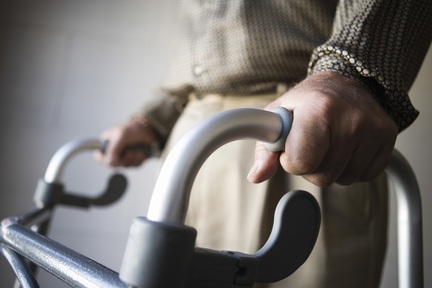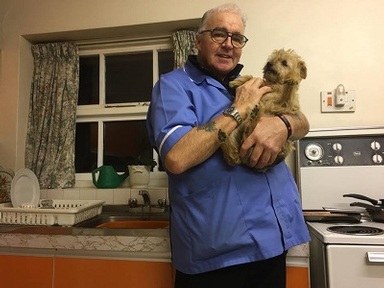NHS announces trials to improve health care using innovative technology
Older people living with long-term health conditions and mental health problems will be among the first individuals to benefit from a new initiative designed to modernise how the NHS delivers care.

The NHS has teamed up with Google, IBM and Phillips to launch ground-breaking projects across Britain which will see people’s health conditions monitored using new technology.
Launching the new schemes at the World Economic Forum in Davos, NHS England chief executive Simon Stevens, said: "Over the next decade major health gains won’t just come from a few 'miracle cures', but also from combining diverse breakthroughs in fields such as biosensors, medtech and drug discovery, mobile communications, and AI computing.
"Our new programme aims to cut through the hype and test the practical benefits for patients when we bring together some of these most promising technologies in receptive environments inside the world's largest public, integrated health service."
At present, 15.4 million people in England have a long-term health condition, while those living with three or more is expected to increase from 1.9 million to 2.9 million by 2018.
Health experts believe the digital scheme could free up resources and allow people to monitor their own health rather than visiting clinics or hospitals. It is estimated that the projects could save the NHS up to £5 bn over the next decade.
Wearable technology
Seven areas across Britain will take part in the pilots which will see patients issued with state-of-the-art, wearable technology.
In Sheffield, people who are frail, elderly, living with disabilities, or who have dementia, will be offered home monitoring systems where everyday appliances will have sensors fitted to check they are moving about their home as normal and eating at regular times.
Those living with chronic conditions such as asthma, diabetes, heart disease or high blood pressure, will be monitored through wearable skin sensors and smartphone apps with data uploaded directly to health records, ensuring problems can be spotted immediately.
Fridges, kettles and curtains of people living with dementia will be wired-up to make sure they are eating properly and getting out of bed, allowing people to stay in their own homes for longer.
People with dementia will also be given tracking devices so that family members can make sure they are not in danger or wandering too far from home. The devices will alert health workers in the event of a fall, and monitor changes in walking patterns. Individuals will also be trained to use online programmes where they can find care plans, diaries, reminiscence pages and online chat facilities.
Hilary Evans, chief executive of Alzheimer’s Research UK, believes trials like these are vital to know whether new technologies can have a real impact on people’s lives. She said: "It’s good to see that tools aimed at helping people with dementia are being evaluated as part of this scheme.
"Many of the projects being assessed aim to support people with dementia to live independently for longer, but there is also a desperate need for new treatments, preventions and better diagnostic tools. Investment in research must continue if we are to defeat dementia, and we must ensure that new treatments can reach the people who need them as quickly as possible."
Medical advances
Life Sciences Minister George Freeman, added: "We are determined to ensure the NHS can remain a pioneer of new treatments and models of care so that UK patients will be amongst the first in the world to benefit from these hugely exciting medical advances, made possible by the life sciences industry in partnership with the NHS.
"Not only does it demonstrate the NHS’s attractiveness as a place to test and develop revolutionary new products, it is also another important step towards creating a truly twenty-first century NHS."
Welcoming the scheme, George McNamara, head of policy at Alzheimer’s Society said: "Two thirds of people with dementia live in the community and we know they want to remain independent and in their own homes for longer. Technology can be invaluable in helping people living with dementia to do this and improve their everyday lives – it can also aid health professionals to deliver person-centred care.
"A quarter of hospital beds are taken up by people with dementia and millions is spent on preventable admissions. Our NHS and social care system has historically been too reactive, dealing with a series of emergencies. With an ageing population and more people living with multiple long-term conditions it is right we focus on prevention and keeping people out of hospital – anticipating and preventing crises. Not only does it make good economic sense, but reduces the human misery associated with emergency admissions to hospital.
"With any implementation of technology it is paramount that the person living with dementia should be at the centre of any decisions made. Each individual is different and their needs should be assessed on a case by case basis."
The pilots are taking place in Birmingham, Sheffield, Lancashire, London, Manchester, the South West, Surrey and Sussex.
Latest Innovative Care News
 13-May-19
'Pink drink' brain cancer treatment rolled out across NHS in memory of Baroness Jowell
13-May-19
'Pink drink' brain cancer treatment rolled out across NHS in memory of Baroness Jowell
 25-Apr-19
Louis Tomlinson helps 83-year-old who lost wife to dementia complete bucket list
25-Apr-19
Louis Tomlinson helps 83-year-old who lost wife to dementia complete bucket list
 05-Mar-19
Care worker of the year inspires nine-year-old son to work in care
05-Mar-19
Care worker of the year inspires nine-year-old son to work in care
 12-Feb-19
Michael McIntyre's jokes tested to see if they stop elderly catching flu
12-Feb-19
Michael McIntyre's jokes tested to see if they stop elderly catching flu
 25-Jan-19
Ninety-year-old and his dog can stay together, thanks to care worker
25-Jan-19
Ninety-year-old and his dog can stay together, thanks to care worker